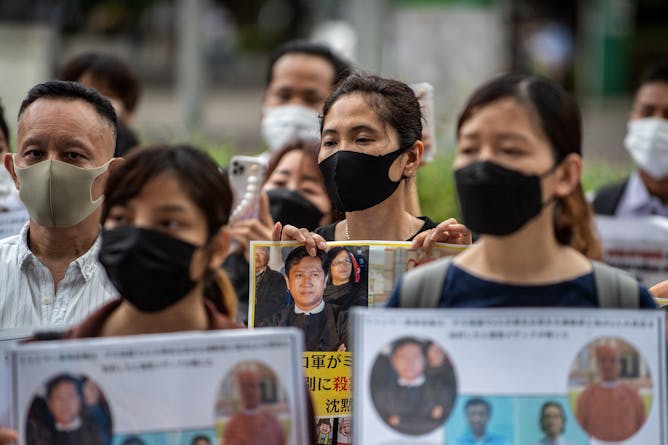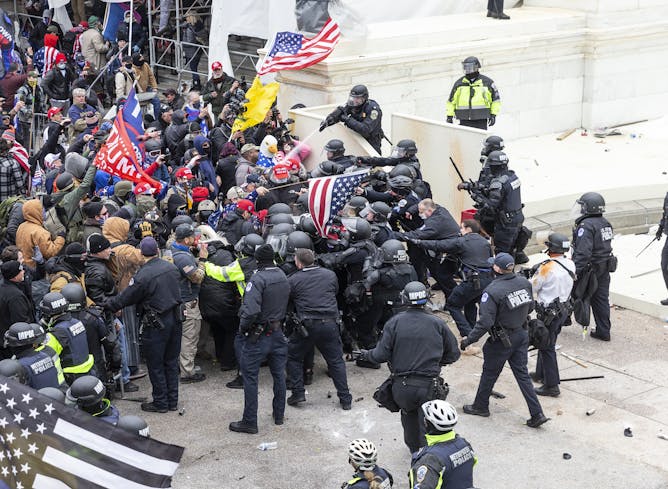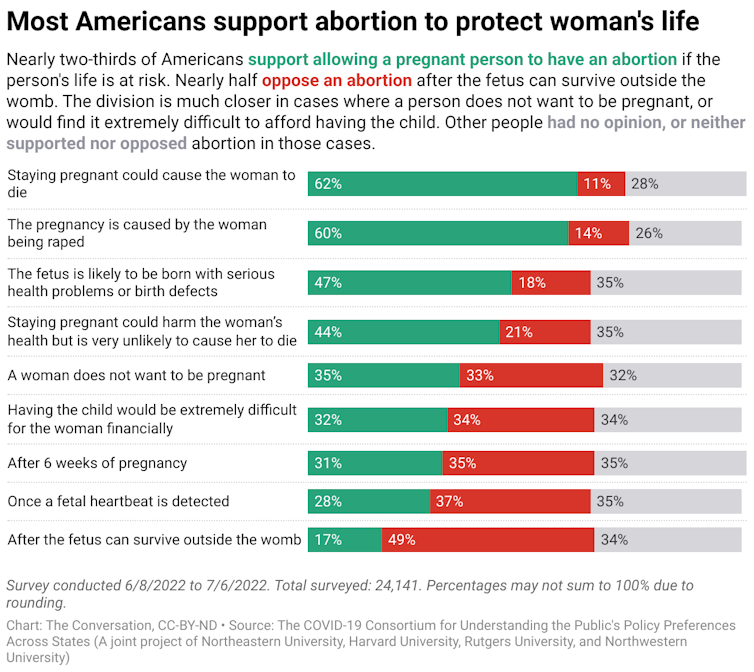|
|
|
|
More than a month after the Supreme Court issued its explosive Dobbs v. Jackson Women’s Health Organization decision, the protests and celebrations that followed the court’s taking away the constitutional right to abortion have slowed.
But as states take up the task of deciding policies to ban, restrict or permit abortion – as the court instructed – residents of states pursuing more restrictive rules aren’t necessarily falling in line. In fact, the opposite appears to be happening.
Public polling and research conducted earlier this month by Harvard Kennedy School public policy and communications scholars Matthew Baum, Alauna Safarpour and Kristin Lunz Trujillo find that the Dobbs ruling has widened the gap between “public preferences and public policy.” (See chart below.)
“Not only are state-level policies currently unaligned with state-level public opinion, but, since the Dobbs decision was announced, Americans also increasingly appear to prefer fewer restrictions on abortion, even as many states are moving to enact more restrictions,” the scholars write in this week’s top story.
|

|
Amy Lieberman
Politics + Society Editor
|
|

The Savannah Medical Clinic, which provided abortions for four decades in Savannah, Ga., is closed now.
AP Photo/Russ Bynum
Matthew A Baum, Harvard Kennedy School; Alauna Safarpour, Harvard Kennedy School; Kristin Lunz Trujillo, Harvard Kennedy School
Justice Samuel Alito said that abortion policy crafted by elected representatives in the states would be more responsive to what constituents want than federal protection of the right. He was wrong.
|

Activists including Myanmar citizens protest in Tokyo on July 26, 2022, against Myanmar’s recent execution of four prisoners
Philip Fong/AFP via Getty Images
Tharaphi Than, Northern Illinois University
Myanmar’s military junta is losing some control over the country, but its execution of four high-profile leaders and prisoners sends a warning to Myanmar citizens and the rest of the world.
|

Pro-Trump protesters and police clash on Jan. 6, 2021, at the U.S. Capitol.
Lev Radin/Pacific Press/LightRocket via Getty Images)
Tim Bakken, United States Military Academy West Point
With the exception of a few states, dereliction of a duty is mostly used in military law and does not apply to citizens, including US presidents.
|
|
|
-
Paul M. Collins, Jr., UMass Amherst; Artemus Ward, Northern Illinois University
Unlike in most countries, US Supreme Court justices enjoy life tenure. Some legal scholars believe that centuries-old custom, meant to protect judicial independence, no longer serves the public.
-
George Michael, Westfield State University
The explicitly anti-democratic movement seems to have the ear of a major GOP donor – along with at least two GOP front-runners for the US Senate.
-
Meredith Oyen, University of Maryland, Baltimore County
The White House has distanced itself from the US House speaker’s potential visit to Taiwan. But does it still signal a shift in policy over diplomatic ties with the island?
-
Peter A. Joy, Washington University in St Louis
Grand juries are meeting in Georgia and Washington, D.C., as part of investigations into attempts to overturn the 2020 presidential election. How do they work?
-
Helen Kapstein, John Jay College of Criminal Justice
A scholar of literature sees striking parallels between contemporary book bans in the US and those that took place in South Africa during apartheid.
-
Rebecca J. Davis, Stephen F. Austin State University
An economist explains coal power’s rise and fall in charts.
-
Tazreena Sajjad, American University School of International Service
A UK plan to move asylum seekers on its shores to Rwanda has been met with stiff opposition from human rights organizations. But the UK persists, and Rwanda is all too willing.

From the story, Overturning Roe is not making laws reflect what people want – new survey highlights flaws in Supreme Court’s reasoning in returning abortion authority to states
|
|
|
Like this newsletter? You might be interested in our other weekly emails:
|
| |
| |
| |
| |
|
|
|
|
|
|
|